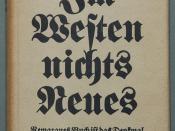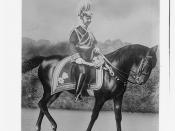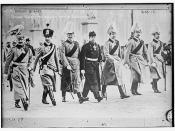Power. The word itself instigates a conundrum of fear and attraction. The attraction for it, the attraction for more, and the attraction for seeking the absolute highest boundary of it. Those who thirst for it see visions of wealth, vast expansions territory, and above all, the ability to do whatever one wants whenever he wants. And those who thirst for it will seek it through whatever means necessary, whether it be a fistfight or a war. Necessity is the basic derivation for all hostility and aggression; therefore, power, and its corruption, is the source of all war. Such corruption is exemplified in the World War I novel, All Quiet On the Western Front, by Erich Remarque, through the eyes of the platoon leader, of the military officials, and of the highest level of power in Germany at the time, the Kaiser.
The bottommost level of power represented in All Quiet On the Western Front is the platoon leader, who is given a pack of soldiers to bully around under his abusive authority.
The authority figure in the novel is Corporal Himmelstoss, who is to train the newly enlisted soldiers in the ways of war. He is described as a semblance of Louis Napoleon in the novel; "a small undersized fellow with a foxy, waxed moustache" (Remarque 23). Immediately the description of Himmelstoss triggers an image of a short, power-hungry figure, the figure that suffers from what many refer to as "small-man's syndrome." His image is further emphasized in the statement: "He had a special dislike of Kropp, Tjaden, Westhus, and me, because he sensed a quiet defiance" (Remarque 23). Himmelstoss's dislike for these soldiers is not directly related to the fact that he supposedly "sensed defiance", but more so to his will to push the soldiers around. He focuses...


